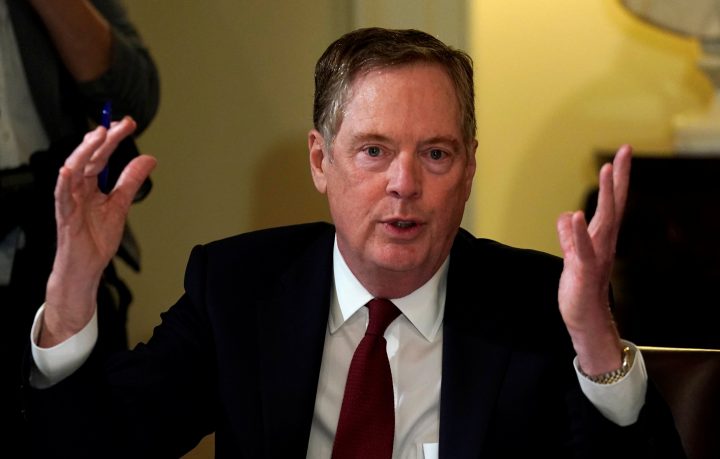WASHINGTON — The Trump administration on Friday labeled 36 countries as inadequately protecting U.S. intellectual property rights, keeping China on a priority watch list and adding Canada over concerns about its border controls and pharmaceutical practices.

The U.S. Trade Representative’s annual report on global IP concerns is separate from the “Section 301” report on Chinese technology transfer practices that has led the world’s two largest economies to threaten each other with tariffs.
The so-called “Special 301 Report on Intellectual Property Rights” calls out China for its “coercive technology transfer practices” and “trade secret theft, rampant online piracy, and counterfeit manufacturing.”
WATCH: Lighthizer says Mexico, Ontario, Quebec, U.S. midterm elections could cause ‘political headwinds’ to NAFTA negotiations

It was the 14th straight year that China was placed on the “Priority Watch List.”
U.S. Trade Representative Robert Lighthizer is due to travel to China next week along with other senior Trump administration officials for talks on U.S. demands for changes in Beijing’s trade and intellectual property policies.
President Donald Trump has threatened up to $150 billion in tariffs on Chinese goods, and China’s Ministry of Commerce has threatened to retaliate in equal measure.
A USTR official declined to comment on Lighthizer’s specific message to his Chinese counterparts next week, but said U.S. officials “anticipate engaging with them meaningfully on all these issues.”
WATCH: Political pressure ramps up to achieve NAFTA deal

The biggest surprise in Friday’s report was the decision to move Canada from the lower-level “Watch List” to the same priority list as China. USTR cited Canada‘s “poor border enforcement,” especially for counterfeit goods shipped through America’s northern neighbor, and concerns about intellectual property protections for pharmaceuticals.
U.S. pharmaceutical companies have long complained that generic versions of drugs still under U.S. patent protection flood in from Canada at much cheaper prices.
NAFTA Talks
The increased criticism of Canada was revealed as Canadian Foreign Minister Chrystia Freeland was locked in intense negotiations with Lighthizer over updating the North American Free Trade Agreement.
Washington has demanded that a modernization of the 1994 pact include stronger IP protections.
READ MORE: Chrystia Freeland says progress made as another round of NAFTA talks wraps up
Lighthizer, Freeland and Mexican Economy Minister Ildefonso Guajardo are trying to work out a number of stumbling blocks in the NAFTA talks, including auto content rules.
The office of Canadian Innovation Minister Navdeep Bains, who launched an intellectual property strategy on Thursday, did not immediately respond to a request for comment.
Ottawa is pledging to create an independent body to oversee patent and trademark issues, “which will ensure that professional and ethical standards are maintained.”
WATCH: Freeland says no deal yet, but parties committed to get NAFTA agreement

Colombia also was added to the Priority Watch List for failing to revise its copyright laws as required under a free trade agreement with the United States.
Saudi Arabia and the United Arab Emirates were added to the Watch List. Concerns about pharmaceutical intellectual property protections, pirated software and counterfeit goods were factors in those decisions, USTR said.
- What is a halal mortgage? How interest-free home financing works in Canada
- Capital gains changes are ‘really fair,’ Freeland says, as doctors cry foul
- Ontario doctors offer solutions to help address shortage of family physicians
- Canada will take bigger economic hit than U.S. if Trump wins election: report



Comments